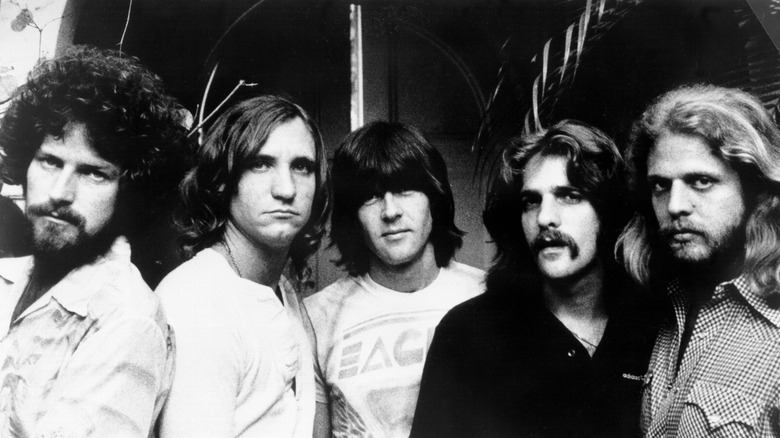The Hidden Meaning Of The Eagles' Hotel California
Since its release in 1976, "Hotel California" by the Eagles has inspired more than its fair share of theories and speculation. Its sharp, vivid lyrics describe glamour and superficiality – "pink champagne on ice," "shimmering lights," etc. — layered atop a secret, insidious world of "dark desert highway[s]" and "voices in the night." The dreamy, acoustic opening segues into a sliding, dark bass, and as the singer encounters strange characters and situations, the song's sense of entrapment grows. And in the end? "You can never leave."
"Hotel California" won 1977's Grammy for Record of the Year. Guitarist Don Felder said he wrote the song's outline from a rented house in Malibu next to the beach. As Rolling Stone quotes Felder telling Guitar World, "I remember sitting in the living room on a spectacular July day with the doors wide open. I had a bathing suit on and was sitting on this couch, soaking wet, thinking the world is a wonderful place to be. I had this acoustic 12-string and started tinkling around with it, and those 'Hotel California' chords just kind of oozed out."
Those chords are perfect for those who just want to hum along and enjoy the music. To those not paying attention to the lyrics, the song could sound like a glorification of a bright, cheery, bubblegum-and-smiles California life. But Felder must have felt wary of such an ideal on that fateful Malibu day because "Hotel California's" chords also provide the perfect backdrop for the song's true, deeper critique.
Glamor and the trap of fame
At the time the Eagles released "Hotel California," the band was getting an "extensive education in life, in love, in business," as Don Henley told Marc Eliot, author of "To the Limit: The Untold Story of the Eagles" (via Rolling Stone). 1975's "One of These Nights" had garnered the Eagles three top-10 singles and hurled its members — Henley, Don Felder, Glenn Frey, Bernie Leadon, and Randy Meisner – into overnight stardom. They were thrust under the microscope of public scrutiny, and pressure for a follow-up was high. 1976's "Hotel California," the album, was that follow-up, and with its lead single, the members of the Eagles gave their verdict on the whole glitz, glam, fame, and commercial success schtick.
As Song Facts describes, "Hotel California's" "full sensory experience" is intentional. Felder's time on the beach got passed along to singer, drummer, and lyricist Don Henley, whose descriptions draw the listener into the song's story. The choice of California, a place mythologized for its idyllic beauty and cabal of Hollywood celebrity, is intentional. when "Hotel California" was written, recorded, and released, the Eagles still romanticized California and Beverly Hills in particular. But even by then, the state's mystique — much like the allure of notoriety and camera flashes — was fading. There was never any physical Hotel California, as Living a Lot says, but Henley did take inspiration from the Beverly Hills Hotel where the band had stayed for a while. That hotel became the figurative center of the web of Los Angeles and the Eagle's Californian experience.
Alternative explanations and dream logic
A big part of the mystery of "Hotel California" lies in the dream logic of its lyrics, which often shift from scene to scene without any linear, rational progression. Guitarist Glenn Frey on Song Facts analogizes the song to a "Twilight Zone" episode, where chains of images create a flowing, imprecise type of narrative.
This is why many folks have come to the conclusion that "Hotel California" is about drug addiction, especially given the "warm smell of colitas" line — "colitas" is Spanish plural diminutive slang for a marijuana bud (via a discussion thread on The Guardian). In this case, the addiction is the "beast" that people just can't kill with their "steely knives."
Lyricist Don Felder, though, says he just wanted to craft a tangible, concrete scene using the senses, like the "I hear the mission bell" line. And the "steely knives" bit? It's actually a reference to fellow 1970s rockers Steely Dan. Steely Dan and the Eagles had the same manager, and the two bands had something of a rivalry. Steely Dan had mentioned the Eagles the year prior in their song, "Everything You Did," saying, "Turn up the Eagles, the neighbors are listening."
Unrelated to Steely Dan, but related to drug addiction, some think that "Hotel California" is about mental health. In this case, the fictional Hotel California plays the role of the sanatorium. Whether the hotel actually helps people recover or just creates new psychoses, however, is up for debate.
The dark underbelly of the American Dream
In 2007, singer Don Henley on "60 Minutes" talked about the meaning of "Hotel California" directly, saying that it's about, "the dark underbelly of the American Dream, and about excess in America which was something we knew about," as Song Facts quotes. Rolling Stone also cites him as saying to Marc Eliot, "In a sentence, I'd sum it up as the end of the innocence, round one." Guitarist Glenn Frey similarly said, "That record explores the underbelly of success, the darker side of Paradise. Which was sort of what we were experiencing in Los Angeles at that time" via Song Facts.
Not only were the Eagles enduring a crash course in the realities of fame during the late '70s — they were also wrestling with internal power struggles. Various members vied for song credits, and there was tension and drama within the group as Henley became known as a "control freak" (via Rolling Stone). All in all, "Hotel California" is about way, way more than living large at a weird roadside hotel. Living a Lot very succinctly summarizes the song's meaning as, "greed in the music industry that eventually leads to the artist's own self-destruction."
And yet, in the end, all of these ingredients — plus some Malibu-beachside inspiration and nitty-gritty songcraft — somehow came together to form the Eagle's biggest hit, lightning-in-a-bottle-style. The song's longstanding success can serve not only as a beacon of musicianship but a lighthouse for would-be stars.



